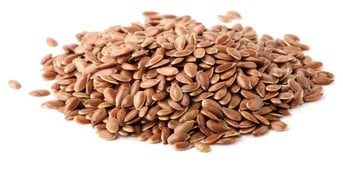

Symptoms of a flaxseed allergy in dogs may include excessive scratching, redness or irritation at the site of contact, skin rashes, swelling of the face/muzzle, hives, nasal discharge, vomiting, and/or diarrhea. Severe allergic reactions may also cause difficulty breathing or other respiratory issues.
Flaxseed allergies in dogs may be caused by a hypersensitivity to the protein found in the seed. This hypersensitivity activates the dog’s immune system, leading to the allergic reactions. Additionally, other components in flaxseed, such as lectins or saponins, may be triggers for the allergic reaction.
In order to diagnose a flaxseed allergy in dogs, a veterinarian may conduct a physical exam, perform allergy testing, and/or review the dog’s medical history. If allergies are suspected, a veterinary doctor may also recommend an elimination diet to better determine what is causing the reaction. To confirm a diagnosis, the veterinarian may need to perform a skin or blood test to detect antibodies in the dog’s system.
A flaxseed allergy in dogs can range from mild to potentially life-threatening. In cases of more severe allergic reactions, dogs may develop anaphylaxis, which can lead to shock and can be fatal if not treated immediately. The mortality rate in dogs with an untreated flaxseed allergy is unknown, but the prompt and appropriate treatment of anaphylactic reactions is essential for any animal’s survival.
Treatment of a flaxseed allergy in dogs may involve avoiding exposure to flaxseed, which may include changing their food and treats to those without flaxseed as an ingredient. Additionally, an antihistamine such as Benadryl may be used to reduce allergic symptoms. In cases of severe allergies, a vet may need to administer corticosteroids or other medications to reduce inflammation and symptoms.
To help prevent a flaxseed allergy in dogs, avoid feeding them foods that contain flaxseed or flaxseed oil. Additionally, always consult a veterinarian before changing your dog’s diet, and give them high-quality, hypoallergenic dog food. Ensure that they are not exposed to areas where flaxseed may be present, such as farms, feed stores, or any other area where flaxseed may be stored or present. Avoid using hemp collars, leashes, and toys, as these may also contain flaxseed.
A flaxseed allergy is not usually contagious and is considered an individual-specific allergy, meaning it is highly unlikely to spread from one dog to another or between humans and dogs. However, some people may undergo cross-reactivity and experience an allergic reaction to fibers from the flaxseed plant if they are allergic to other fibers from the same plant group.
Some home remedies that may help to manage a flaxseed allergy in dogs include avoiding flaxseed in their diet, bathing the affected areas with warm water and oatmeal shampoo, and providing anti-itch medication such as Benadryl.
It’s important to keep in mind that these home remedies may not be a guaranteed solution to a flaxseed allergy in dogs, and it’s always best to consult with your veterinarian for advice if your dog is suffering from allergies.
Several breeds of dogs may be vulnerable to flaxseed allergy, including Labradors, German Shepherds, Beagles, Dachshunds, Cocker Spaniels, and Golden Retrievers. These dogs may experience skin irritations, inflammation, gastrointestinal issues, and respiratory distress when allergic to flaxseed. It is important to be aware of any potential allergy before feeding foods containing flaxseed to your dog, as a reaction can be severe.
Have you ever noticed these symptoms in your dog due to an allergy to flaxseed? If so, what was your reaction and how did you manage the process? Whatever your experience, it’s important to be vigilant and take any allergic reactions seriously to ensure your pet’s safety and wellbeing. It can be difficult dealing with allergies in our furry friends, so I’m wishing you the best of luck in future and hope it all goes smoothly.